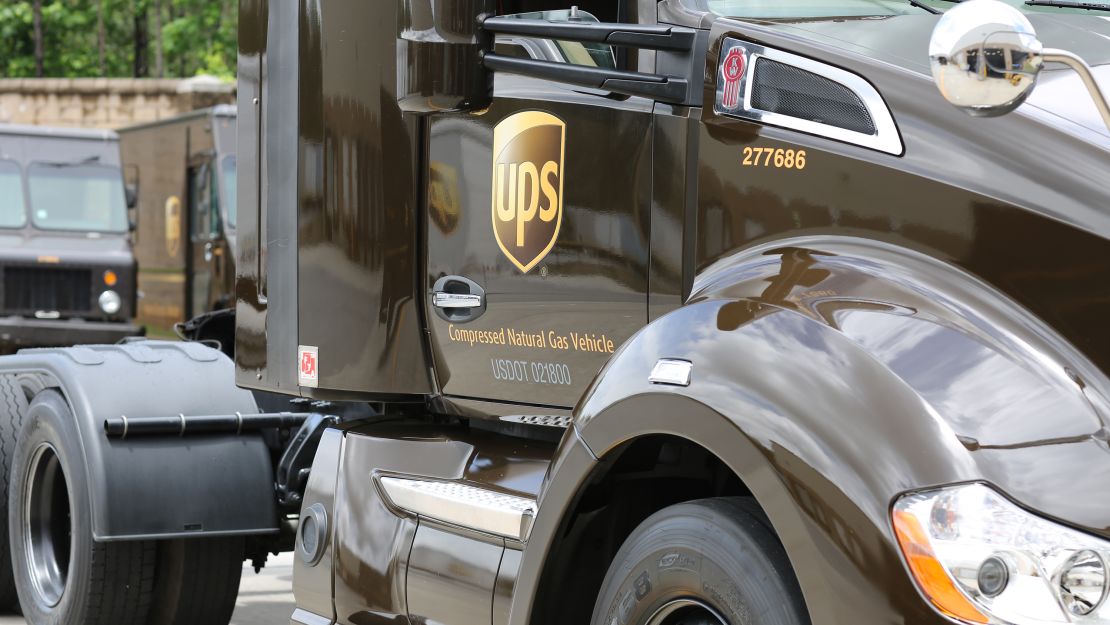One company’s trash is another company’s alternative fuel source.
UPS (UPS) announced on Wednesday it’s buying 170 million gallons of renewable natural gas — a fuel that is produced naturally from bio sources like landfills, dairy farms and wastewater treatment facilities.
The purchase, which UPS described as the largest of its kind in US history, will help the company deliver its goal to reduce greenhouse gas emissions of its ground fleet 12% by 2025.
“Our customers want to ship more but with less impact,” Mike Casteel, director of fleet procurement at UPS, told CNN Business.

By switching to renewable natural gas, UPS estimates its vehicles will reduce as much as 1.2 million metric tons of greenhouse gas emissions through 2026. That’s the equivalent of removing more than a quarter million vehicles from the road.
The move comes as shipping companies face tougher rules on truck pollution from regulators in the United States and recently Europe.
The benefit from renewable natural gas comes from capturing harmful methane emissions that were going to be released into the environment anyway. Methane gas is 25 times more damaging to the environment than carbon dioxide.
Each gallon of renewable natural gas that’s used by a truck is a gallon that doesn’t need to come from fossil fuels.
“The idea is to use energy that’s already being created — instead of wasting it,” Casteel said.
How does it work?
Renewable natural gas, also known as biomethane, isn’t new.
“It’s been around for a long time but it’s starting to spread a little more due to the climate change discussion,” said Jade Patterson, a natural gas analyst at BNEF.
More than 26 renewable natural gas projects were developed in the United States between 2011 and 2018, according to Deloitte. Another 63 new projects are currently in the works, Deloitte said.
Here’s how it works: Before it can get released into the atmosphere, methane gas is removed from buried waste at landfills, dairy farms and wastewater treatment plants. That methane gas is then turned into renewable natural gas in a purification process that removes water and carbon dioxide.
Once processed, the renewable natural gas gets injected into the nation’s existing natural gas infrastructure. It can then be used to fuel trucks that run on natural gas.
UPS estimates that the total production and use of renewable natural gas results in up to a 90% reduction in greenhouse gas emissions compared with diesel.
‘Dirt-cheap’ to produce regular natural gas
In this case, UPS has agreed to buy up to 25 million gallons of renewable natural gas from Clean Energy Fuels, a Newport Beach, California-based natural gas company that was co-founded by billionaire T. Boone Pickens.
UPS operates more than 6,000 natural gas trucks in its fleet and is on track to use 100 million gallons of natural gas this year.
“We’re on a quest to make as much of that renewable natural gas as we can,” Casteel said.
The problem with renewable natural gas, however, is that it’s relatively expensive to create, and thus is in limited supply. That’s especially true because the United States has a glut of traditional natural gas, care of the shale boom.
“It’s dirt-cheap to produce regular natural gas,” said Ned Harvey, managing director at the Rocky Mountain Institute, a nonprofit focused on clean energy. “It’s pretty difficult to compete with gas coming out of the Permian Basin.”
To incentivize the production of renewable natural gas, the government provides credits in the form of the Renewable Fuel Standard, which also supports ethanol and biodiesel.
That program allows UPS to buy renewable natural gas at the same price as traditional natural gas. UPS is hoping that its large commitment will give confidence to suppliers and other commercial users.
Electric vehicles are the future
Still, the long-term future of this space is in electric vehicles, not renewable natural gas-powered ones.
Not only are electric vehicles much better for the environment, but they’re becoming increasingly economical as companies continue to invest in new technology.
Earlier this month, Germany opened its first electric highway for trucks on a 6-mile stretch of the autobahn.
And a startup in Sweden recently started testing a driverless truck, marking the first time a fully self-driving truck without a backup driver has been allowed on a public road.
UPS already has about 300 electric vehicles in the United States and Europe as well as around 700 hybrids. And the shipping giant has reserved 125 electric semi-trucks from Tesla (TSLA) and is working with Cincinnati-based Workhorse Group (WKHS) to design electric delivery trucks.
Casteel said UPS is “actively engaged” with multiple manufacturers about expanding its electric vehicle fleet.
“We find it very hard for gas or anything else to compete with the opportunity created by the electrification of trucking,” said Harvey.








